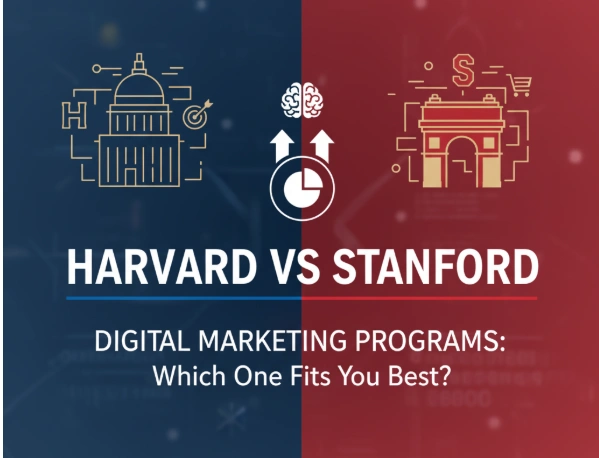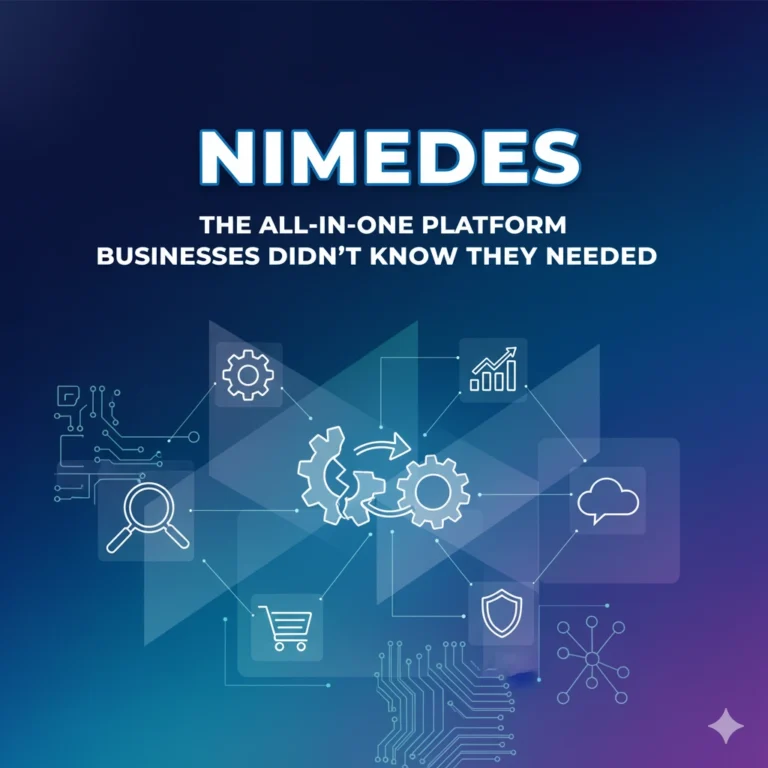Harvard vs Stanford Digital Marketing Programs: Which One Fits You Best?
Choosing between Harvard and Stanford digital marketing programs is no small decision. Both names carry global prestige, both promise powerful career opportunities, and both attract ambitious learners from around the world. But here’s the real question: which one is right for you?
The truth is, the choice isn’t just about rankings or brand names. It’s about the type of marketer you want to become, the environment you thrive in, and the long-term value you expect from your education. Let’s break it down step by step.
Why Digital Marketing Programs Matter More Than Ever
Before diving into Harvard vs Stanford, let’s zoom out. Why does digital marketing education even matter today?
- Businesses live online 24/7, and they need skilled marketers to help them grow.
- Traditional ads like TV and print can’t compete with the power of digital.
- Skills like SEO, paid ads, social media, content marketing, and analytics are in high demand across every industry.
- Companies don’t just want marketers; they want digital-first strategists who can future-proof their growth.
That’s why a certificate or program from a top university isn’t just a résumé booster—it can shape your entire career path.
Harvard’s Take on Digital Marketing

Harvard approaches digital marketing with its trademark business-first mindset. Instead of focusing only on the “how” of campaigns, Harvard digs deeper into the “why.” You’ll explore consumer behavior, strategy, and data-driven decision-making.
Where you’ll find Harvard programs:
- Harvard Business School Online (HBS Online)
- Harvard Extension School
- Executive education and certificate programs
What makes Harvard stand out:
- Business foundation first – Digital marketing lessons are rooted in broader management and strategy.
- Executive-level teaching – Many courses cater to professionals aiming for leadership roles.
- Case study method – You’ll study real campaigns, dissecting what worked, what didn’t, and why.
- Global networking – Harvard’s connections with Fortune 500 leaders and international corporations are unmatched.
Bottom line: If you see yourself in leadership or consulting, Ivy League education offers a framework built for strategists.
Stanford’s Take on Digital Marketing
Stanford’s style feels completely different. Located in the heart of Silicon Valley, Stanford embraces technology and innovation. Digital marketing here is more than strategy—it’s about hands-on application and cutting-edge tools.
Where you’ll find Stanford programs:
- Stanford Graduate School of Business (GSB)
- Stanford Continuing Studies
- Professional certificate programs
What makes Stanford stand out:
- Tech-driven focus – Strong emphasis on data, automation, AI, and analytics.
- Silicon Valley advantage – Guest speakers, projects, and partnerships with startups and tech giants.
- Practical learning – While Ivy League education leans theory, Stanford gives you tools you can use right away.
- Flexible pathways – Programs are designed to fit around busy professionals’ schedules.
Bottom line: If you’re excited about startups, innovation, or blending marketing with technology, Stanford is your playground.
Harvard vs Stanford: Side-by-Side Comparison
| Factor | Harvard | Stanford |
|---|---|---|
| Curriculum Style | Strategy and business-focused, heavy use of case studies | Tech-forward, analytics, hands-on learning |
| Target Audience | Executives, consultants, corporate leaders | Entrepreneurs, tech-savvy professionals, innovators |
| Networking | Multinational corporations, global leaders | Startups, Silicon Valley tech ecosystem |
| Learning Style | Structured, academic, leadership-driven | Flexible, experimental, innovation-driven |
Who Should Choose Harvard?
Ivy League education might be your best bet if you:
- Aspire to lead marketing teams or become a strategist.
- See yourself in consulting, management, or corporate roles.
- Prefer structured learning with case studies from global companies.
- Value the prestige of the Ivy League education brand (because let’s be honest, it does open doors).
Who Should Choose Stanford?
Stanford could be the right fit if you:
- Want to combine marketing with tech and data-driven tools.
- Are excited about startups, experimentation, and innovation.
- Prefer learning through projects and hands-on practice.
- Want to build connections with entrepreneurs and Silicon Valley leaders.
Cost and Investment
Neither school is cheap, but you’re paying for more than classes—you’re paying for the brand and the network.
- Harvard digital marketing certificates: $1,600 – $3,600. MBA-level programs are much higher.
- Stanford digital marketing certificates: Around $2,500 – $4,000. Graduate business programs are also on the high end.
Tip: If you just want skills (not the brand), platforms like Coursera, HubSpot, or Google’s certifications offer affordable options. But if global recognition and connections matter,leading research university and Stanford are in a league of their own.
Career Outcomes: What Graduates Gain
- Harvard alumni often move into senior roles in consulting, management, or corporate marketing. The Harvard name adds instant prestige to any résumé.
- Stanford alumni frequently join tech-driven companies, scale startups, or even launch their own ventures. Innovation and entrepreneurship are part of the DNA here.
Conclusion
So, which is better for digital marketing—Ivy League MBA program or Stanford? The answer depends on you.
Choose Harvard if you want strategy, leadership training, and global business prestige.
Choose Stanford if you want innovation, technology-driven learning, and Silicon Valley exposure.
Both will transform your career, but the best choice depends on whether you see yourself thriving as a global business strategist or a tech-savvy innovator.
FAQs
Q1: Which is better for digital marketing, Harvard or Stanford?
It depends on your goals. top-ranked institution
emphasizes leadership and strategy, while Stanford focuses on innovation, technology, and hands-on learning.
Q2: Are Harvard and Stanford digital marketing programs worth the cost?
Yes, if networking, prestige, and advanced career opportunities matter. For skills only, affordable online options may be more practical.
Q3: How much do Harvard and Stanford digital marketing certificates cost?
Harvard’s range is about $1,600–$3,600, while Stanford’s costs $2,500–$4,000. MBA-level programs at both schools are significantly higher.
Q4: Who should choose Harvard’s digital marketing program?
It is ideal for aspiring executives, consultants, and those seeking a global business network with a strong strategy-driven curriculum.
Q5: Who should choose Stanford’s digital marketing program?
Stanford suits entrepreneurs, innovators, and professionals who want tech-driven, flexible, and practical learning experiences in Silicon Valley.







